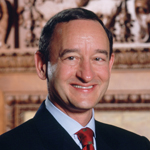 |
 |
 |
 |
|
Chancellor Mark S. Wrighton shares his thoughts with the community about achieving WUSTL’s goals of quality, diversity and affordability.

|
|
 |
|
|
University of Michigan IT innovator John Gohsman will serve as WUSTL’s first chief information officer. During his 30-year career, Gohsman found new ways to use information technology to help in the classroom and laboratory.

|
|
 |
|
|
A team of researchers received a one-year grant from WUSTL’s International Center for Advanced Renewable Energy & Sustainability (I-CARES) to take an interdisciplinary, “human-centered” approach to making buildings more energy-efficient. The team will work with Quadrangle Housing’s Green Rehab project, an effort to retrofit student apartments.

|
|
 |
|
|
Trevor A. Dawes, associate university librarian at WUSTL, recently was installed as president of the Association of College and Research Libraries, an international organization. He hopes to expand the role of academic libraries.

|
|
 |
|
|
Scientists have created a virtual model of the brain that daydreams like humans do. They hope the model will help them understand why certain portions of the brain work together when a person daydreams or is mentally idle. Shown is the study’s senior author, Maurizio Corbetta, MD.

|
|
 |
|
|
School of Medicine researchers want to know whether they can reduce the rate of unintended pregnancies at community clinics by providing contraceptive counseling that emphasizes the benefits of long-acting birth control, like IUDs and implants, and by making these methods available to women at sharply reduced costs or free of charge. Pictured is principal investigator Tessa Madden, MD.

|
|
 |
|
|
A rover named Zoe set out into the Atacama Desert, on the South American coast, in June to test a suite of instruments intended for future missions to Mars under Mars-like conditions. One of the instruments aboard Zoe was a Raman spectrometer designed by a team led by WUSTL scientist Alian Wang. A fragile lab instrument that was ruggedized to survive the desert, the Raman spectrometer is expected to fly on the 2020 Mars mission.

|
|
 |
|
|
Children born with a complete absence of the external ear canal, even if only one ear is affected, are more likely than their peers to struggle in school, according to new research at the School of Medicine.

|
|
 |
|
| » View more Record stories |
 |
|
|
|

|
9:15 a.m. Friday, Aug. 9
Thirteenth Julio V. Santiago, MD, Memorial Lecture.
“Dr. Julio Santiago’s Prophecy: Diabetes and Family Functioning,” Barbara Anderson, assoc. head, psychology section, Baylor College of Medicine and Texas Children’s Hospital. Free and open to the public. Wohl Clinic, Clopton Aud.
(314) 454-6006.
Noon Monday, Aug. 12
The First Year Reading Program, WUSTL’s popular book club for incoming students, is expanding to include the entire WUSTL community. Discussion of Notes From No Man’s Land. Meets at noon daily through Aug. 16. Co-sponsored by Office of Human Resources. Record story/event details. Olin Library, Room 142.
|
|

|
WUSTL received a prestigious award from ACUTA, a nonprofit group serving information technology professionals at higher education institutions. ACUTA awarded WUSTL an Institutional Excellence in Communications Technology Award this year.
Three internationally renowned scientists will speak about photosynthesis and its relevance to the global energy crisis. Intended for the general public, “Photosynthesis in our Lives” will take place from 3 to 5 p.m. Sunday, Aug. 11, at the Hyatt Regency at the Arch. Reservations are encouraged by today.
|
|


Three decades as an athletic trainer at WUSTL FULL STORY
|
|
 |
 |
 |
 |
|
|
| |

One Brookings Drive
St. Louis, MO 63130
314-935-5000
wustl.edu
|
|
Directory | Record | Record Staff | Safety Alerts
You have received this e-mail because you expressed interest in receiving updates from wustl.edu, the Record and its related products by e-mail. Thanks for your subscription.
If you do not want to receive the Record via e-mail, you may unsubscribe.
Got this as a forward? Sign up to receive our future e-mails.
|
|
|
|

